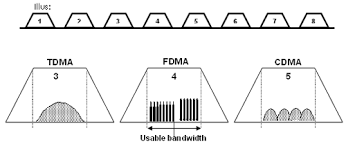This is a question relating to channel access methods, a complicated and technical issue best approached by consulting specialist works such as The Guide to Wireless Communcations by Olenewa & Ciampa, or Radio Engineering and Antennas by Iqbal Singh Josan. However, here a few pros and cons.

Time Division Multiple Access - this splits the channels into time slots and is chiefly used by the mobile communications industry. This method can cause interference near other devices (such as when a mobile makes strange noises near computers or ATMs). Ideal for video compression and high speed digital information transmission.
Code Division Multiple Access - developed in the USSR during the early stages of the Cold War, this is a more flexible form of TDMA which isn't tied down to timing, but functions through an algorithm of percentage and average of individual use. Peaks and troughs in use can therefore accommodate, in theory, more users than the limited, unchanging numbers of the above two methods.
Space Division Multiple Access - uses the simpler theory of 'geographical' location if users, by allocation of individual bands or 'pipes' of channels. Used by cell networks, satellite systems and cell radio networks. Base stations typically use three antennas over a 120 degree array, saving power by reaching users in an known specific area.
There's plenty of help on channel access methods, on specialist sites like electronicdesign.com, or even video sharing sites like YouTube. Why not grab a notepad and take a few notes?